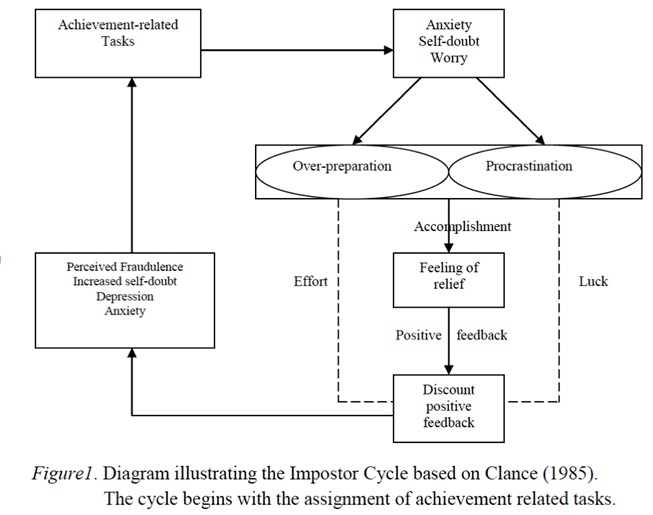
‘We regret to inform you that the letter of appointment we sent you was a mistake. You do not qualify for the position.”
“We regret to inform you that your promotion has been reviewed, and we find that we had made a mistake. You are not ready for the promotion.”
These are fictional letters that I have often received. Every time I was offered a job in a dream company, I always thought that they had made a mistake, and they would find out. No, it was not modesty and certainly not temporary. Recently I won a very large contract amidst fierce and established competitors. Every time, I received a “we need to talk now” message from a client, my mind starts wondering if the deal has been cancelled. The patterns tend to repeat themselves.
It is a syndrome where you feel that you did not deserve the accolades and acclaim. You feel that you are a fraud. Dr. Pauline Clance and Dr. Suzanne Imes called this the Impostor Syndrome, which they discovered while observing high achieving women, who felt that they were intellectual frauds. They called it an “internal experience of intellectual phoniness in individuals who are highly successful but unable to internalise their success”.
Joan Harvey and Cynthia Katz estimated that around 70% of us have experienced this at some point in our lives. There is a gender issue at play here. Women are more prone to the syndrome and experience more intense bouts. In their book on the subject, If I’m So Successful, Why Do I Feel Like a Fake? The Impostor Phenomenon they define the Impostor Phenomenon as “a psychological pattern rooted (1) the belief that he/she has fooled other people in estimating their abilities, (2) fear of being exposed as an impostor, and (3) Attributing their success to external factors like - luck, extra work, misjudgment, error, charm, charisma instead of internal qualities such as ability, intelligence, resilience, talent, or skills.
Women would generally blame their failure due to internal abilities and men would blame outside factors. Women would attribute their success them to external factors such as luck and men would attribute them to internal qualities.


Meryl Streep with her Oscar for Best Actress for 'The Iron Lady'at the 84th Annual Academy Awards on February 26, 2012. AFP
You can take the quiz designed by Dr Valerie Young here.
A fraud waiting to be found out.
I am a fraud: At one level, the achievers think that they have slipped through the system, and it is just a matter of time before they are found out. They believe they might not be smart enough or capable enough or knowledgeable enough to deserve the positions that they hold.
What I am doing is fraudulent: At a deeper level, they consider their work as fraudulent. They may be highly acclaimed doctors, writers, artists, actors, or lawyers but they feel that they are hardly special. They believe that their work holds no value. They doubt the difference that they are making.
A luck or just fluke – Will never happen again: They believe that they were just in the right place at right time. Their success will not be repeated. They cannot relate to the steps they took to be in the right place, or for that matter the hard work.
Charm - My good looks that take me places: Some women believe that their charm or attractiveness is the reason they got the job or the results. Even worse, someone might have told them that their “good looks” was the reason they got the sale.
Stereotypes -People tell you that you are an impostor: You can imagine the impact that stereotypes can wreak on people’s minds. There is a directive to have a minimum of one woman on every Board of Directors. You can imagine what goes through the woman’s mind when she enters the boardroom, thinking her gender and not her capability is the reason that she is in that room. Many times recruitment consultants are told to look for women candidates so that the company can correct their gender imbalance. When a recruiter mentions this to the candidate, I wonder what their thought processes is.
Social media can be really cruel. You get treated like an impostor. Tina Dabi who topped the 2015 Civil Services examination was trolled because her family belongs to a certain reserved caste and was accused of taking undue benefit from a flawed system.
Perfectionism – the problem of never being good enough
The Impostor syndrome is a privilege of high achievers. Their fear of failure makes them set very high standards. If they meet their high standards, they tend to discount or even reject the positive feedback. They have difficulty internalising their success and value. When they fail to achieve their high standards, they are overwhelmed and disappointed.
Fear of failure – When mistakes are not an option
Failing to meet their unrealistic standard precipitates shame and humiliation. They cannot even take constructive feedback on small aspects of their performance.
The Guilt of Success – I was not meant to be succeed
In families, a child might get the label as the “intelligent” one. For the other children, this builds a mindset that they are not supposed to succeed. As a result, children look for validation.
If the child is the “intelligent” one, there is a pressure to perform. If the child is not the “intelligent” one, they do not get the required encouragement. When they both are successful, their success is undermined by either high expectation or incredulity.
The Impostor Cycle

When confronted with an achievement-oriented task, the victims tend to get anxious, thinking that they are about to be found out. Anxiety triggers the typical fight–flight response. They try and overcome the perceived lack of ability by overworking. For example, before a presentation, they will rehearse much more than their colleagues.
Once the person accomplishes the task, the good feelings are short lived. Their success is attributed to only hard work or luck. Even when encouraged with positive feedback, they tend to discount the feedback and reinforce their perceived fraudulence.
Over time, impostors tend to develop strong beliefs that if they do not follow the same working pattern, they will fail.
The ultimate explanation for the impostor phenomenon lies in a fundamental fact about the human mind: we only know what's going on inside our own heads.
The consequences are obviously unhealthy.
Jessica Collett and Jade Avelis have studied why female academics were more likely than men to “downshift” in their careers. They found that impostorism was to blame. They would tend to lower their goals and ambitions to confirm with their perceived lack of ability.
In corporate life, women who were led to believe that they are not cut out for a high-stress corporate life might lower their ambitions. While negotiating salaries, bonuses and increments, their self-doubt of personal value and contribution might lead to settle for less than what they deserve.
Their reinforcing self-doubt leads to psychological distress such as chronic fear, self-doubt, guilt, depression, and shame. The frenzied overworking leads to being overwhelmed at constantly needing to prove their credentials and therefore face a potential burnout.
There is a name for the syndrome. Remind yourself that if you feel you are a fraud; you are in great company. Remind yourself that you are not alone. It might be hard to believe that other senior leaders in responsible positions such as medicine, politics, research, and law face impostorism.


Maya Angelou speaking at a rally for Barack Obama, 2008. Wikimedia Commons
Now that you know that these are just feelings and thoughts, and not a fact. Try and move away from a monologue of self-doubt. Remind yourself about it, and begin to construct a slightly more balanced argument.
Remind yourself that you are on your own journey. Self-doubts begin to emerge when you compare yourself with others. We tend to compare our weaknesses with the strengths of others. Instead, match your strengths to your own journey. Consider what value you bring to the table instead of being as good as the other person.
It might be tough but try and accept a compliment without building a conspiracy theory. Take the compliment at face value. Maybe you do have the abilities that others tell you. Look at your list of strengths.
When faced with success, try and retrace the skills that you used. Think about other instances where you have done well. Maybe think about the value systems that you have demonstrated. Maybe you might see a pattern that goes beyond just luck and overworking.
Ask mentors for feedback. They might remind you about your strengths and how you have developed your strengths over the years.
Just a word of caution. Do not compare yourself to your mentor. This might set you out on a thought process that you are really inadequate.
It really helps if senior leaders can admit that at times they felt like an impostor. Knowing someone has been in your shoes does help. Newcomers have a tough time adjusting to new cultures. Try and make them feel at home. Ever so gently, take the impostor thought away from them.
Your mind might be screaming for you to downshift on your goals. Take on a large goal and jump in. Think about which strengths you might use and which strengths you might develop along the way.
To conclude, we have all walked in the shoes of feeling like an impostor. When people told you that you were not good enoug, or that you would not amount to much, you decided to challenge them and set out on your own journey.
At some point in time, you might be thinking of giving it up. Before you give up or downshift, just consider, is the impostor is at play? Remind yourself of your personal power, abundance, and personal journey of growth and power on.
Maya Angelou, Jodie Foster, Meryl Streep, Denzel Washington. They have all been there.
The author is the Founder of The Positivity Company, where he helps business leaders become more positive and productive. Birender can be reached on birender.ahluwalia@gmail.com.